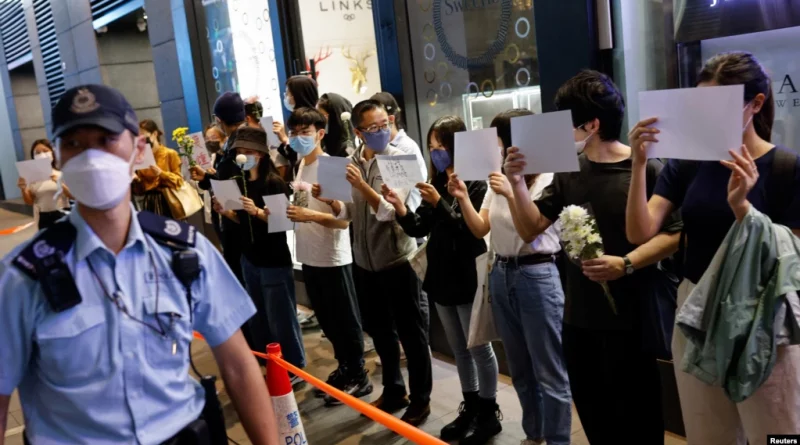U.S. Supports Peaceful Protests in China
U.S. Supports Peaceful Protests in China
The United States supports the right of people to protest peacefully, including in China, a spokeswoman for the U.S. National Security Council said Monday about protests and demonstrations taking place in recent days in several Chinese cities.
There have been protests, particularly in Shanghai and Beijing. They are directed against the Chinese authorities’ harsh measures against COVID-19.
“We have long said that everyone has the right to peaceful protests – here in the U.S. and around the world. Including in the PRC,” the spokeswoman explained, adding, “We believe the PRC has a very difficult time containing this virus with its zero-tolerance strategy…”
This past weekend, protesters took to the streets of PRC cities to oppose harsh restrictions and lockdowns over the coronovirus, a show of civil disobedience unprecedented since Xi Jinping came to power. In the past 10 years, under his leadership, dissent in China has been harshly suppressed. In addition, the country has expanded its use of high-tech surveillance, making any expression of protest even more difficult and risky.
“Protests in China are a great shame for Xi Jinping. The Communist Party of China has just completed a big congress. And now the man elected virtually dictator for life is being harshly criticized and attacked across the country. This is a real problem. There is a lot of hidden frustration, people who have experienced isolation, stuck in their apartment, have been very angry. There were many instances where people, unfortunately, were virtually unable to work. They couldn’t buy groceries and other things, which was also very frustrating. And young people also have the problem of finding a job. They’re very frustrated about their future. So I think all these things came together, and the fire incident led to the current events. Suddenly people saw others protesting and decided to join them. I think almost every observer of China is surprised at how fast and how far these protests have gone,” Doug Bendow, CATO Institute expert.
Demonstrators clashed with police late Sunday night in the commercial center of Shanghai, after which a bus filled with arrestees left the area.
BBC British public broadcaster Ed Lawrence, a journalist covering the demonstration, was also detained.
“The BBC is extremely concerned about the treatment of our journalist Ed Lawrence, who was arrested and held in handcuffs for hours before being released. He was beaten and kicked by police during his detention. This happened while he was working as an accredited journalist,” the BBC said in a statement.
On Monday, Chinese police blocked some downtown streets in Shanghai with blue metal barriers to prevent crowds. Stores and cafes in the area are closed.
Also on Monday, police in Beijing and Shanghai stopped and searched people in places where protests were held over the weekend. Locals and social media users said police demanded that passersby show their cell phones in an effort to check whether they had virtual private networks (VPNs) and the Telegram app the protesters were using. The use of VPNs is considered illegal in China.
The protests were catalyzed by a fire last week in an apartment building in Urumqi city in the Xinjiang Uygur Autonomous Region in northwest China.
Ten people died in the fire.
It is believed that they were unable to escape from the burning house because the entrance was blocked due to strict anti-coveting restrictions. Parts of Urumqi, home to about 4 million people, were closed to quarantine for 100 days.
Crowds of people in Urumqi took to the streets on November 25. Last weekend, protesters in cities such as Wuhan and Lanzhou overturned booths for COVID testing?
There were student protests at a number of universities in China.
On Saturday in Shanghai, a candlelight mourning ceremony on Urumqi Street (named after the city of the same name) in memory of those killed in the fire turned into protests. The Associated Press reported that on the video of this protest, calls were heard loud and clear: “Xi Jinping! Get out of office! CCP! Resign!”
In Beijing, mass demonstrations took place after midnight on Sunday on the city’s ring road. Some protesters held blank sheets of paper, a symbol of protest against censorship.
